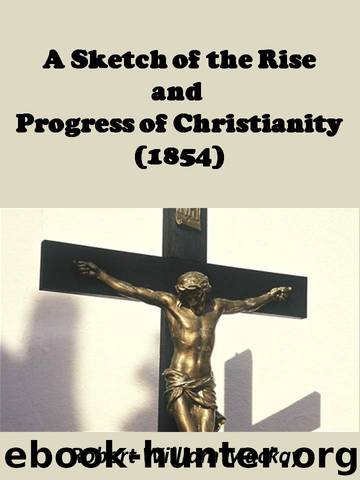A sketch of the rise and progress of Christianity by Mackay Robert William 1803-1882

Author:Mackay, Robert William, 1803-1882
Language: eng
Format: epub
Tags: Church history
Publisher: London, Williams
Published: 1853-12-31T16:00:00+00:00
Part V. Origin and Progress Of Dogma
1. The Ebionitic and Gnostic Christology.
Christianity was a religious revival founded on feeling. It appealed directly to the soul of the recipient. Its advent was the soul's retreat from all its usual points of contact with external life, from vain forms of worship, from immoral gratifications of the senses, from the hopelessness of national and individual enterprise, and from the over-sanguine researches of philosophy. The soul's asylum was itself, within itself it found that which had been the goal of heathen philosophy as well as of Jewish expectation—religion, and the object of religion, God. Thus the idealism, which originally was only subjective, had a natural tendency to become an objective one. The mental impression naturally directs attention to the object producing it, and Christianity was in the same way impelled to seek an objective basis, soon to become entirely absorbed in the contemplation of it. Men could not rest satisfied with a mere sentiment, they required a definite hope, and an external guarantee to assure them of its truth. In filling up its out lines they could not stop short of that union with God which is the great aim of all religion, and while thus striving to make good human deficiency out of divine fullness, they naturally found the required assurance in the claims and character of him by whom the new aspirations had been suggested. To bring the divine object of these aspirations nearer to the consciousness, to help the mind by means of ideal links and resting-places to comprehend its capacity for divine reunion, and thus to develop the full significance of its faith, continued for many ages to be the great unpremeditated aim of Christian speculation and teaching.
The character and attributes of Jesus were thus made to supply that substantial connection between God and man which had been wanting in Judaism, and his divinity, symbolic of the mental elevation of his followers,, became the leading dogma of his religion. At first vaguely felt or surmised, it was after words directly questioned and adjudicated, the different successive phases of the religion producing proportionately-altered conceptions respecting the attributes of the Founder. When Christianity was Judaical, Christ was the son of David or Jewish Messiah, a "man-descended man," but a man especially endowed with the divine Spirit. For although a Jewish Messiah was necessarily human, there was a tendency, even in Judaism, to elevate his character. The prophets had exhausted language in panegyric on the coming Savior, and when long secular disappointment concentrated the thoughts upon a future world, he became, instead of a merely temporal deliverer, a supernatural Being or Angel "coming in the clouds." All religion naturally invests the Deity with the character of parent in reference to the human race. The Jews, as God's chosen people, claimed a peculiar right to address Him as their Father, and this relationship they applied especially to the successive magistrates or "mediators" of their theocracy, to prophets, judges, and, above all, to kings. Thus
Download
This site does not store any files on its server. We only index and link to content provided by other sites. Please contact the content providers to delete copyright contents if any and email us, we'll remove relevant links or contents immediately.
The Vikings: Conquering England, France, and Ireland by Wernick Robert(79183)
Ali Pasha, Lion of Ioannina by Eugenia Russell & Eugenia Russell(39931)
The Vikings: Discoverers of a New World by Wernick Robert(36828)
The Conquerors (The Winning of America Series Book 3) by Eckert Allan W(36709)
Cecilia; Or, Memoirs of an Heiress — Volume 1 by Fanny Burney(32080)
Cecilia; Or, Memoirs of an Heiress — Volume 3 by Fanny Burney(31471)
Cecilia; Or, Memoirs of an Heiress — Volume 2 by Fanny Burney(31425)
Empire of the Sikhs by Patwant Singh(22777)
Hans Sturm: A Soldier's Odyssey on the Eastern Front by Gordon Williamson(18334)
The Secret History by Donna Tartt(18236)
Cat's cradle by Kurt Vonnegut(14785)
Sapiens: A Brief History of Humankind by Yuval Noah Harari(14000)
Pimp by Iceberg Slim(13809)
Talking to Strangers by Malcolm Gladwell(12899)
Norse Mythology by Gaiman Neil(12867)
Leonardo da Vinci by Walter Isaacson(12821)
Underground: A Human History of the Worlds Beneath Our Feet by Will Hunt(11850)
4 3 2 1: A Novel by Paul Auster(11823)
The Radium Girls by Kate Moore(11642)
